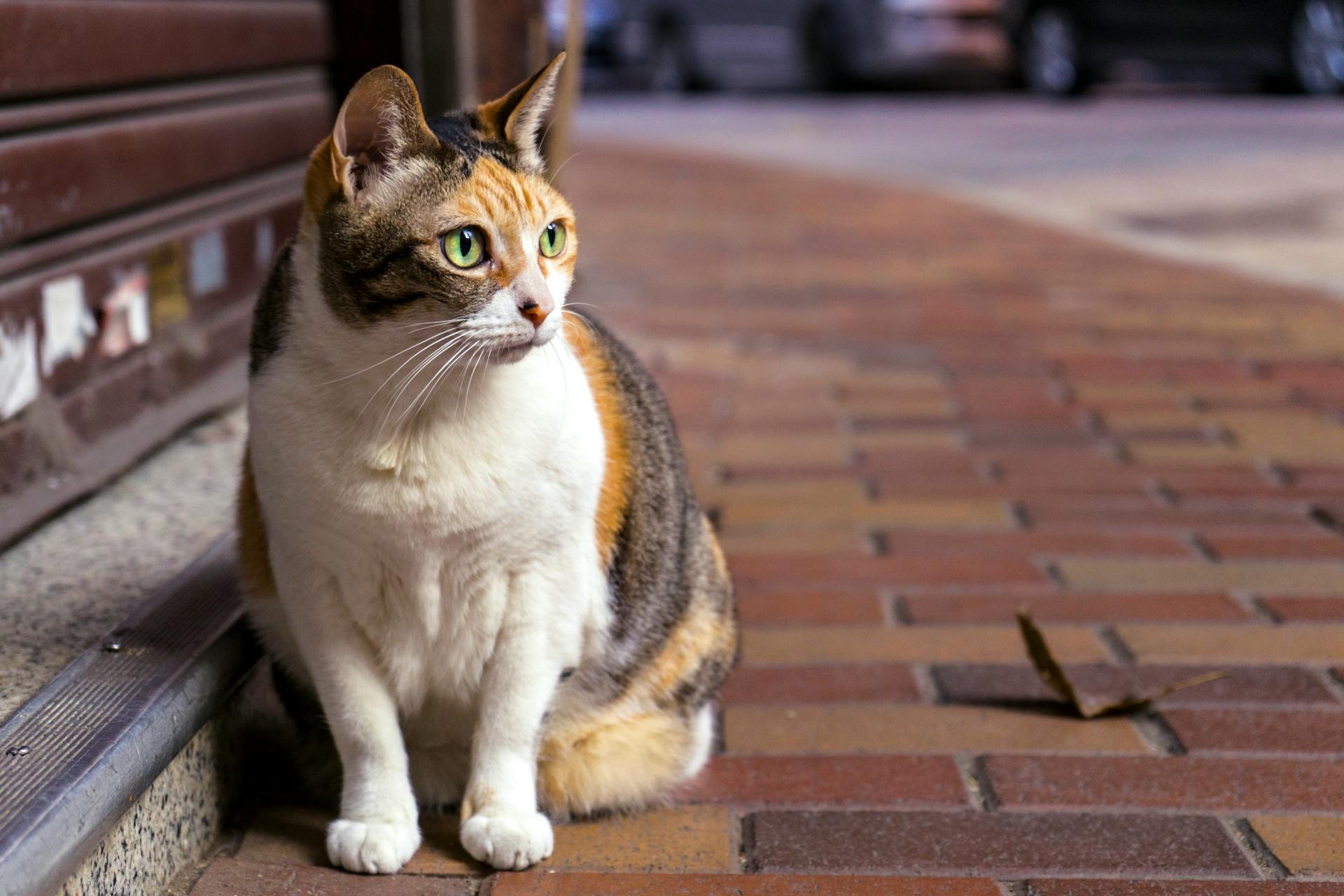
Cats can indeed get kennel cough, although it's less common than in dogs.
The primary cause of kennel cough in cats is the same as in dogs: Bordetella bronchiseptica, a bacterium that infects the upper respiratory tract.
Symptoms of kennel cough in cats are often mild and may include a runny nose, sneezing, and a mild cough.
Cats that are immunocompromised, such as those with feline leukemia or AIDS, are more susceptible to kennel cough and may experience more severe symptoms.
A unique perspective: How to Help with Kennel Cough
What Is Kennel Cough in Cats?
Kennel cough in cats is a real concern, and it's not just limited to dogs. Cats can contract kennel cough, especially in enclosed spaces with poor circulation, like shelters or boarding facilities.
This illness can spread through the air, as well as through contaminated surfaces and objects, like bowls, toys, and even your hands. So, it's essential to disinfect if you think you've come into contact with a pet with kennel cough.
Cats are less likely to get kennel cough because they don't participate in social activities like dogs do, but it's still possible. Kennel cough can be transmitted to other pets, even after their symptoms have cleared up, so it's crucial to wait for your vet's okay before letting your cat socialize.
While kennel cough is usually not life-threatening in cats, it can be serious for very young, very old, or immunocompromised cats.
Signs and Symptoms of Kennel Cough in Cats
If your cat is showing signs of illness, it's essential to call your vet and explain her symptoms.
A cat with kennel cough might not have a cough, unlike dogs. Instead, cats are likely to demonstrate symptoms associated with broad-spectrum upper respiratory infections.
Conjunctivitis, or irritation and inflammation of the tissues around the eye, is a common sign of kennel cough in cats.
Eye discharge and sneezing are also symptoms that may indicate your cat has kennel cough.
Nasal discharge and fever are other signs that your cat might be under the weather with kennel cough.
In some cases, a persistent dry cough with a hacking or honking sound may be present.
Here are some common signs of kennel cough in cats:
- Conjunctivitis
- Eye discharge
- Sneezing
- Nasal discharge
- Fever
- Persistent dry cough with a hacking or honking sound
Treating Kennel Cough in Cats
If you suspect your kitty has come down with kennel cough, contact her vet for treatment options. The treatment plan for a cat with kennel cough varies with the severity of the infection.
Typically, kennel cough is self-limiting, meaning it will run its course without medication. This is good news for most cat owners, as it means they can often treat their cat at home.
Severe cases of kennel cough in cats may require antibiotics. If your cat is experiencing symptoms, it's essential to consult with a veterinarian to determine the best course of action.
Cats with kennel cough may become congested and lose their sense of smell. To encourage your cat to eat, try warming up her favorite meal or providing super smelly, extra yummy food.
A humidifier or a steamy bathroom can also provide nasal relief for your cat. This can help make her more comfortable and encourage her to eat and drink.
Preventing Kennel Cough in Cats
You can reduce the risk of spreading kennel cough to other pets by keeping new pets separate for a short period of time after bringing them home.
It's best to disinfect your hands if you believe you've come into contact with a pet with kennel cough.
Kennel cough can live on surfaces and be passed from pet to pet via contaminated objects, so make sure to keep your cat's environment clean.
Keeping your kitty up to date on all standard vaccines will keep her happy and healthy.
The Bordetella vaccine can be a good option if you plan to board your cat or have a group of cats from other households together.
It's best to wait for the okay from your vet before engaging your pet in social activities, even after symptoms have cleared.
Discover more: Preventative Care Keeping Your Pet Healthy Year-Round
Can My Cat Get Kennel Cough?
Kennel cough is less common in cats than dogs, but it is possible.
Cats with a bad cough should be taken to the vet to stop the disease from progressing to pneumonia, which can be fatal.
Even if it may not be kennel cough, a persistent cough in cats always warrants a vet visit.
Frequently Asked Questions
What does kennel cough sound like in a cat?
Kennel cough in cats typically sounds like a dry, hacking cough with honking noises, often followed by retching. If you suspect your cat has kennel cough, look for other symptoms like a runny nose, sneezing, and listlessness.
What is the cat equivalent of kennel cough?
Feline bordetellosis is the cat equivalent of kennel cough, caused by the bacteria Bordetella bronchiseptica. This contagious illness is more common in cats than previously thought.
How long does kennel cough last in cats?
Kennel cough in cats typically lasts 7-10 days, but can persist longer or lead to complications like pneumonia that may take 2-3 weeks to resolve.
Can cats get over kennel cough without antibiotics?
Cats can recover from kennel cough without antibiotics if symptoms are mild, but medication may be needed if they develop a fever, stop eating, or have breathing difficulties. If you suspect your cat has kennel cough, it's best to consult with a veterinarian for proper guidance.
Is cat kennel cough contagious to humans?
While rare, humans can contract kennel cough from their pets, especially those with compromised immune systems. However, it's essential to note that the risk of transmission from cats to humans is relatively low.
Sources
- https://bondvet.com/b/can-cats-get-kennel-cough
- https://www.dailypaws.com/cats-kittens/health-care/cat-conditions/kennel-cough-in-cats
- https://www.denherdervet.com/blog/kennel-cough/
- https://www.petwellclinic.com/wp/2023/01/31/what-is-kennel-cough-why-does-it-matter/
- https://forevervets.com/blog/kennel-cough-causes-and-treatments
Featured Images: pexels.com


